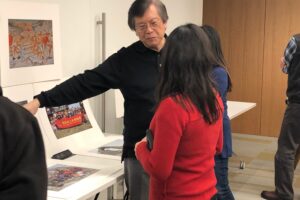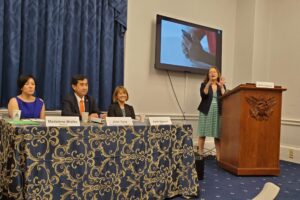Co-written by: Saniya Han & Kyle Wang
The Museum of Chinese in America hosted a forum on “Asian American Allyship for Black Lives Matter” on June 19, or Juneteenth, a day which commemorates the emancipation of the formerly enslaved in the U.S. and also marks the anniversary of the murder of Vincent Chin. For the panelists, — former U.S. Ambassador to China Gary Locke, President-Designee of Queens College Frank Wu, and their moderator, MOCA director Nancy Yao Maasbach — the focus of the conversation echoed the day’s historic significance, centering the histories of both anti-Asian as well as anti-Black discrimination in the United States.
The conversation was framed around three central questions which were posed to the panelists and the audience. The first question, “Are you comfortable discussing topics of race?”, received a majority of “Yes” responses from the audience (76% in total). Dr. Wu then opened with context on the formation of Chinese diaspora in the United States, explaining that Chinese — and, more broadly, Asian — migration to the United States occurred not as a continuous process but in individual waves. This segmented migration, Dr. Wu noted, creates multigenerational divides which may lead to differing perspectives and opinions on politics and race.
Echoing Dr. Wu’s assertions, Ambassador Locke recalled his own childhood, noting the nakedly anti-Japanese sentiments his mother often echoed. Recognizing that these sentiments have always existed — pan-Asian solidarity being a relatively new concept — is crucial, Locke suggested, to building effective allyship for Black Lives Matter. He then affirmed the need for better education across generations about discrimination against Asian-Americans to build support and solidarity for Black Lives Matter.
For Ambassador Locke, the “education” theme continued as the panelists and audience were posed the second question: “Do you feel equipped to seek out diverse resources to educate yourself on Black Lives Matter?” As was the case with the first question, most of the audience — nearly 83% this time — responded affirmatively.
Framing the issues of anti-Blackness in the Asian American community as one of miseducation, Locke re-emphasized the need for solidarity. “When African Americans talk about centuries of discrimination, [we need to understand that] we have also faced that, and therefore our interests in moving forward have to be alongside those of African Americans.” Asians, too, in Locke’s words, historically faced discrimination at the hands of the American government; the most recent wave of protests following the murder of George Floyd merely re-exposes centuries of discrimination which many marginalized communities had been forced to endure. Education about Black Lives Matter, for Ambassador Locke, thus requires Asian Americans to learn of their own fraught history in the United States, and how their interests historically aligned with the broader struggle for Black Civil Rights.
Dr. Wu concurred, offering historical perspective on the legal status of Asian Americans. During the era of codified racism before Civil Rights, Dr. Wu noted, Asian Americans were never — in the eyes of the law — considered to be “white” and were also victims of legalized discrimination. It was only in the 1980s that the Model Minority Myth, the notion that Asian Americans had achieved their socioeconomic success through hard work alone, was invented as a means of “false flattery which elevated Asian Americans while putting others down,” said Dr. Wu. Combating the Myth is thus also a crucial component of effective allyship.
To conclude, Dr. Wu and Ambassador Locke responded to the third and final question: “Do you think Asian Americans are ready to be allies for Black Lives Matter?” Audience answers showed a near fifty-fifty split. In response, Dr. Wu pointed out that the current moment required all individuals to choose a side: “We need to talk about allyship and be good allies,” he said. “There are no bystanders.”



